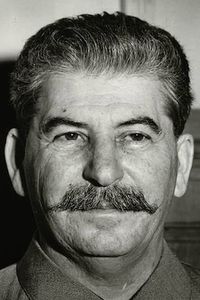Iosif Vissarionovich Stalin, born Dzhugashvili, was a multifaceted Soviet figure, holding various prominent positions in politics, state, military, and party spheres.
Born in Gori, Tiflis province, Russian Empire, Stalin would go on to become a Russian revolutionary, actual leader of the USSR, and a stalwart figure in Soviet politics.
Stalin held the esteemed position of General Secretary of the Central Committee of the CPSU from 1922 to 1953, as well as the title of Marshal of the Soviet Union in 1943 and Generalissimo of the Soviet Union in 1945.
In addition to his leadership roles, Stalin also served as People's Commissar of Defense of the USSR, Chairman of the Council of People's Commissars of the USSR, and Chairman of the USSR State Defense Committee.
Throughout his career, Stalin held various influential positions, including:
* Secretary General of the Central Committee of the All-Union Communist Party of Bolsheviks from April 3, 1922, to February 10, 1934
* Secretary of the Central Committee of the All-Union Communist Party of Bolsheviks from 1952
* Chairman of the Council of People's Commissars of the USSR from December 19, 1930
Stalin's journey began in 1912, when he was included in the Central Committee of the RSDLP at the suggestion of V.I. Lenin, and he subsequently chose the pseudonym "Stalin" for himself.
During the October Revolution, Stalin was elected a member of the All-Russian Central Executive Committee and the Council of People's Commissars.
In 1922, he was elected a member of the Orgburo and the Politburo of the Central Committee of the RCP (b),as well as the General Secretary of the Central Committee of the RCP (b) when Lenin was Chairman of the Council of People's Commissars of the USSR.
After Lenin's weakening and death, Stalin emerged victorious from the internal party struggle, becoming the leader of the state and the actual founder of the totalitarian dictatorship in the USSR.
In 1928-1929, Stalin initiated the transition from the New Economic Policy (NEP) to industrialization, collectivization, and the building of a planned economy, and intensified the policy of the cultural revolution in the USSR.



























































